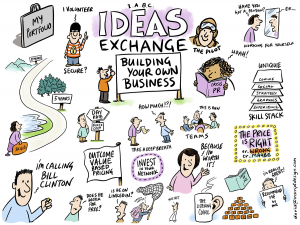Learning without experts
Michael Gove famously claimed that Britain had had enough of “Experts.” Whether he is right or not a lot of change involves venturing into new territory. New ways of working require people to work together to learn from each other. The Ideas Exchange is an approach to learning used with members of the International Association of Business Communicators. It is based on the assumption that we can learn from and teach each other based on our own experiences, ideas, insights and questions.
From one expert to many learners, to many experts and many learners
Rather than having one “expert” and a number of learners in the meeting, everyone is an expert and everyone is a learner. The focus for learning needs to be something that all can contribute to. We chose to focus on “How to run your own business?” and invited all members of the UK chapter. We ended with experienced business founders, in house consultants, interim contractors and students.
The Ideas Exchange
Business is changing rapidly and companies are not just transforming themselves but reinventing the way they work. We need approaches to learning and change that are more flexible and adaptive. Groups and exchanges like this can be set up and run with minimum preparation. The principles of the Ideas Exchange are that:
- We are responsible for our own learning
- We can learn as much (maybe more) from experience and discussion as from books or experts
- Personal stories and experiences are more memorable
- We learn together and from each other
- The more we participate/give the more we extract/take
- Small (micro) groups provide more space for contributions
- We share responsibility for facilitation to get the most from our meetings
- Change is chaotic and unpredictable – we make our own meaning
Facilitation
Sessions like this need proper facilitation. Participants need to take a high level of responsibility for the effectiveness of the process which means that there needs to be careful priming so that people understand how the process works. Overall facilitation will therefore be “light touch” but it needs to follow a structure. Micro groups are essential to maximise contributions, rotation helps build relationships and plenary discussion help integrate the learning. On the human dynamics, dominant individuals need managing and no one should feel compelled to contribute.





